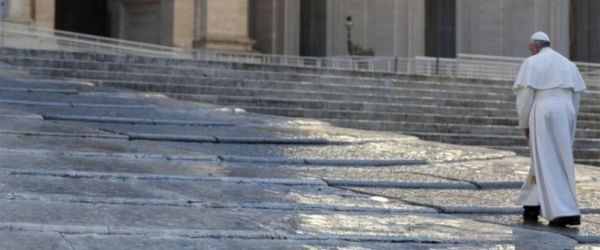Jesus uses the metaphors of salt and light, and his words are directed to the disciples of every age, therefore also to us.
Jesus invites us to be a reflection of his light, by witnessing with good works. He says: “Let your light so shine before men, that they may see your good works and give glory to your Father who is in heaven” (v. 16). These words emphasize that we are recognizable as true disciples of the One who is the Light of the World, not in words, but by our works. Indeed, it is above all our behaviour that — good or bad — leaves a mark on others. Therefore, we have a duty and a responsibility towards the gift received: the light of the faith, which is in us through Christ and the action of the Holy Spirit; and we must not withhold it as if it were our property. Instead we are called to make it shine throughout the world, to offer it to others through good works. How much the world needs the light of the Gospel which transforms, heals and guarantees salvation to those who receive it! We must convey this light through our good works.
The light of our faith, in giving of oneself, does not fade but strengthens. However it can weaken if we do not nourish it with love and with charitable works. In this way the image of light complements that of salt. The Gospel passage, in fact, tells us that, as disciples of Christ, we are also “the salt of the earth” (v. 13). Salt is an ingredient which, while it gives flavour, keeps food from turning and spoiling — in Jesus’ time there were no refrigerators! Thus, Christians’ mission in society is that of giving “flavour” to life with the faith and the love that Christ has given us, and at the same time, keeping away the contaminating seeds of selfishness, envy, slander, and so on. These seeds degrade the fabric of our communities, which should instead shine as places of welcome, solidarity and reconciliation. To fulfil this mission, it is essential that we first free ourselves from the corruptive degeneration of worldly influences contrary to Christ and to the Gospel; and this purification never ends, it must be done continuously; it must be done every day!
Each one of us is called to be light and salt, in the environment of our daily life, persevering in the task of regenerating the human reality in the spirit of the Gospel and in the perspective of the Kingdom of God. May there always be the helpful protection of Mary Most Holy, first disciple of Jesus and model for believers who live their vocation and mission each day in history. May our Mother help us to let ourselves always be purified and enlightened by the Lord, so as to become, in our turn, “salt of the earth” and “light of the world”.
[Pope Francis, Angelus 5 February 2017]












